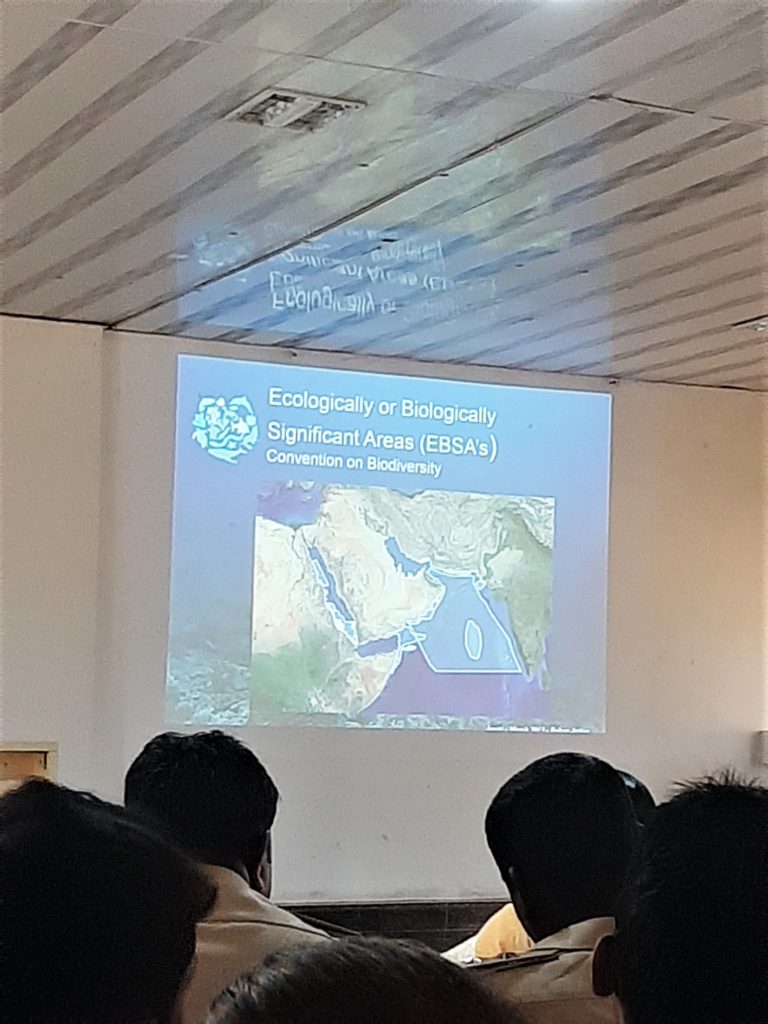
Marine Mammal Stranding Response Best Practices Session – Manjesh BM, Field Officer, FSL India
FSL India has been a strong contributor towards the conservation of Sea Turtles and the marine ecosystem for more than a decade. In this connection, the HBP team of FSL India’s Centre for Experiential Living had the opportunity to participate in a Marine Life session on ‘Marine Mammal Stranding Response Best Practices’, organised by the Forest Department of Karnataka.
The session was held on the 17th of October 2019, at the Forest Department’s office in Kundapura, as a workshop for the local officers. Recently, Karnataka State announced their goal to get involved more in marine conservation and ‘first response’ regarding incidents of stranded animals. To preserve the marine ecosystem, and support the Forest Department, our International volunteers and staff also gave their commitment to rescue marine mammals such as whales, sharks and dolphins.
Most of the audience was from KSF, but also, some coastal security police members attended. 7 FSL India representatives, i.e. the coordinators and 5 volunteers took part in the session. The sessions were conducted by Mr Mahi Mankeshwar and Ms Dipani Sutaria. The topics addressed amongst others were:
- Different marine and coastal ecosystems and their relevance for the environment
- Whales/Dolphins and their evolution, characteristics and biology
- What to do with stranded sea mammals (dead and alive)
The stranded sea mammals’ session was mainly about dolphins. Big whales will probably not survive on land, because their body is unable to protect their organs against their own weight outside water.

When a marine mammal is stranded on the beach, in case of a dead or alive stranding, the responsibility of our STC volunteers and staff is to give information to the concerned personnel. It is of crucial importance to:
- Call the Forest Officer
- Call a Veterinary doctor
- Call a locally based researcher to save the life of the mammal.
We also need to get involved with them to handle live animals, take measurements of dead strandings, and help to bury the mammal. Next, we need to do a survey, update data and report to the respective departments and officer. Also, importantly, we need to create awareness on mammals amongst the fishermen community/public and schoolchildren.
So, what do you do when you find a living, stranded animal on the beach?
First of all, the animal is most likely really stressed because of the unnatural situation. No need to hurry during rescue and make it even more stressed. If you do it slowly and correctly, everything will work out fine. Most marine mammals are able to survive half a day on land, if treated in the right way.
- Provide shade (minimise dehydration)
- Keep its skin moist with wet towels, but don’t cover its nose on the back. It needs to breathe.
- Dig out holes below the flippers (front sides) and fluke (back) to release pressure and put the mammal in its usual position. Fill the holes with water.
- Check if you can already release/refloat it again (check any injuries etc)
- If you can release it, you need a big harness, stretcher or blanket, and at least 4 people to carry it:
- Put the animal on top of the blanket in an upright position
- Station 2 people in front of the flippers to carry it, and at least 2 more at the back
- Go to a spot that is suitable to walk in deeply
- Carry the animals as deep as possible. Try to get in more than 2 metres
- To release it, move the blanket back and forth gently, to make it comfortable again
- Release it

The objective of the presentation was to educate local officials, because they are likely to work in situations with stranded animals in the future. The experts talked about the biological differences between sea mammals and fish, but also topics like “How to protect the beaches from erosion”. Furthermore, they gave background knowledge on the subject. We learned, for example, about the evolution of whales.
We were happy to get the invitation and took some practical knowledge back with us. It was a good presentation on different topics, and we got interesting insight into the Forest Department. We are looking forward to the next session on another topic from the Forest Department. We, at FSL India’s Centre for Experiential Living, Kundapur pledge to support them in all their efforts towards marine life conservation.